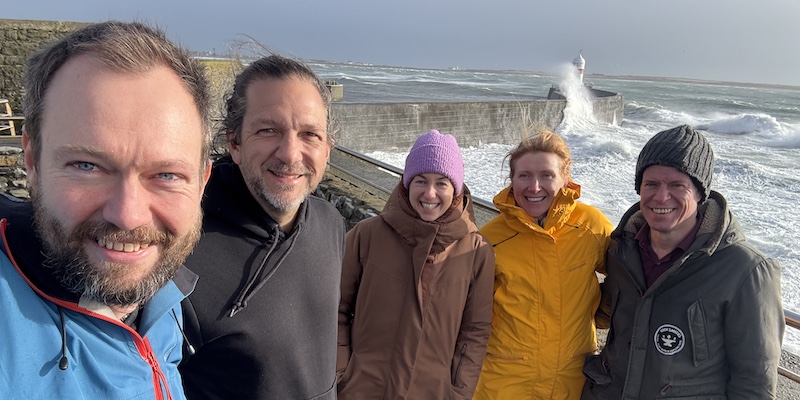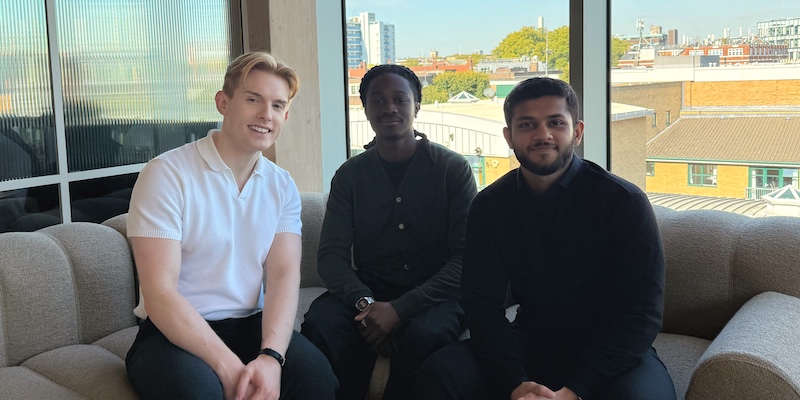
10 Questions with LVNDR
A Stonewall report from 2018 found that 1 in 7 LGBTQ+ individuals avoided seeking healthcare for fear of the discrimination they may face. After his own negative experiences within the healthcare system, Josh Armistead set about improving the accessibility to information and resources in this space. LVNDR was born.
LVNDR exists to give LGBTQ+ people equal access to healthcare. They're building a platform aiming to reduce social inequalities in existing healthcare services, starting with sexual health and gender identity care.The team took part in BGV’s first remote programme back at the start of 2020. In only a short period of time, they have gone from strength to strength, including closing a £1.5m seed round earlier this year.
The success of this round reflects the market opportunities in digital health and sexual wellness. However, it also stands in stark contrast to the experiences of some of LVNDR’s peers. As recently as 2020, less than 1% of VC funding went to LGBTQ+ founders, and over one third chose to keep their sexual orientation hidden while fundraising. In this context, the success of LVNDR is not only benefiting the lives of their users, but has a positive impact on the VC industry as a whole.
Josh is the co-founder and COO of LVNDR, and in this interview he shares how he and his co-founders came together to create what LVNDR is today, the impact their services have had so far, and their ambitions for the future.

Where did the idea for LVNDR come from, where did it all begin?
As a group of co-founders we each had different paths that led us to LVNDR. My personal story is when I was at university I had a number of difficult experiences trying to access sexual health services which caused a significant amount of anxiety. I remember meeting a GUM clinician who was overly critical about my lifestyle.
These experiences pushed me to work on sexual health as part of my dissertation, which turned into an early version of what LVNDR became when I graduated. The initial idea was centred around how individuals can improve their awareness of risk when it comes to sexual health to reduce anxiety, and then to improve access to the resources that are available to them though digital interventions and signposting.
In late 2019, I was introduced to Chris and Araxie who had both had similar experiences when trying to access services in the US and in Lebanon. The vision alignment was instant and we formed what LVNDR Health is today - going beyond the initial idea to expand into actually building and delivering the inclusive services. The real motivation behind LVNDR is the belief that the only way to make the system truly inclusive is to rework the way services are delivered from the ground up.
What do you hope LVNDR will change?
One of the key issues we have identified is that there is a lack of trust in healthcare systems due to feelings of neglect and a history of being disregarded. A 2018 Stonewall report found that 1 in 7 LGBTQ+ individuals avoided seeking healthcare for fear of discrimination, that’s over half a million individuals in the UK alone. With LVNDR we hope to create a higher standard for LGBTQ+ care across the UK, making sexual healthcare accessible to all, irrespective of gender identity, sexual orientation, ethnicity, geography or socioeconomic status. We aim to go beyond the boundaries of the current standardised care model.
Who are you hoping LVNDR will help?
Initially we’re gearing the LVNDR platform to the LGBTQ+ community, a group who we’ve found are the most affected by the current inequalities in the system. However, the services will be freely available to all individuals, and we are working directly with local authorities to integrate our offering with their existing resources.
What makes LVNDR different from anything else out there?
We pride ourselves on our community focused approach to healthcare. We’ve found that taking this approach makes it much easier for us to gain clarity about the needs of individuals and build trust. This in-turn makes it far easier to ensure we are making a substantial impact on the health outcomes of users. Trust is key and I believe that is undervalued in healthcare at the moment.
Are there any success stories you can share about the impact you have had on your users?
We’re still in the build and beta phase at LVNDR, so our current impact with users is minimal. However, even prior to launch, we are finding that we are fostering a more open conversation within the community about sexual health and wellbeing. For example, we’ve spoken to members of the community who have taken a new perspective on managing their own safety while navigating their sexual relationships, as a direct result of the content put out by LVNDR. Additionally to this we have played a significant role in educating and signposting at-risk individuals to treatments such as PrEP.
What’s one thing you wish you had known at the beginning of your startup journey?
Probably the largest learning curve when it comes to LVNDR was effectively navigating the sometimes convoluted structures of public healthcare and procurement. Particularly when it comes to sexual health which historically operates separately from the rest of the healthcare structure in the UK.However, the systems are complex for a reason, and with the support of some amazing local authority representatives and advisors, we’ve managed to map our way through the system. It’s a large undertaking but it’s essential for any company wanting to deliver healthcare innovation at scale.
What do you think is the most important quality in a co-founder or teammate?
We’re lucky in that we have 3 founders with complementary skill sets, but this comes with the need to collaborate and trust each other. I think this is the most important aspect of a co-founding team.
Other than LVNDR, what other Tech For Good company do you admire?
In terms of the early stage companies I’ve met, Inhabit stands out. I really like the passion of the founders and the simple guiding focus they work by. Plus it’s hard not to get behind the environmental cause.
If someone wanted to find out more about LGBTQ+ sexual healthcare and why it's important, where would you signpost them?
Well the first port of call should obviously be the LVNDR Health socials! You can find us on Twitter and Instagram. But aside from that plug, there are some amazing resources produced by Terrence Higgins Trust, Fumble, and the NHS more generally. It really comes down to your specific needs and sorting through what’s out there, which we hope LVNDR will soon be able to help with.
What’s next for you and your venture and how can people help?
Over the coming months we’ll be showing a lot more of what we’ve been working on from both a partnership and product side, so keep an eye out for that. And how can people help? Well I think that comes down to sharing our message and directing those who can benefit from what we offer to us! Join our waitlist at lvndr.com
If you’re an aspiring tech for good founder and interested in applying to BGV for funding and support, you can find out everything you need to know about what we look for and what we offer here. If you would like to speak to a member of the BGV team about your tech for good venture, let us know here.
If you are interested in finding out more about diversity and inclusion in the BGV portfolio, download our 2020 Impact Report.





